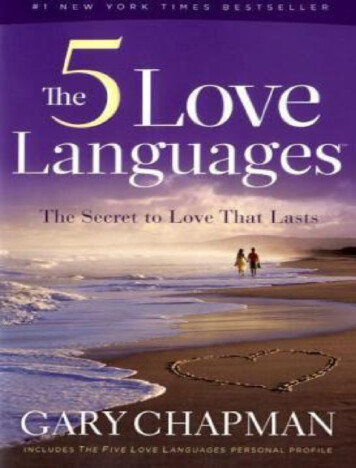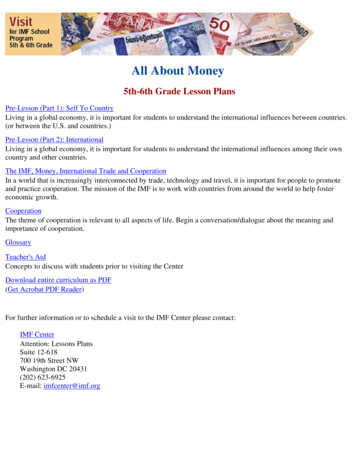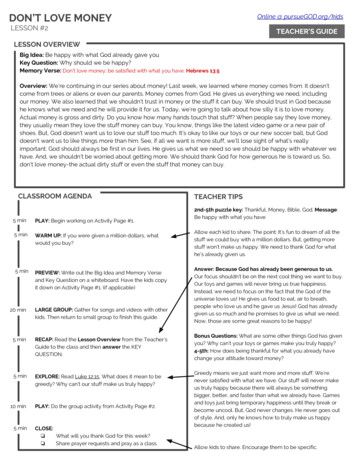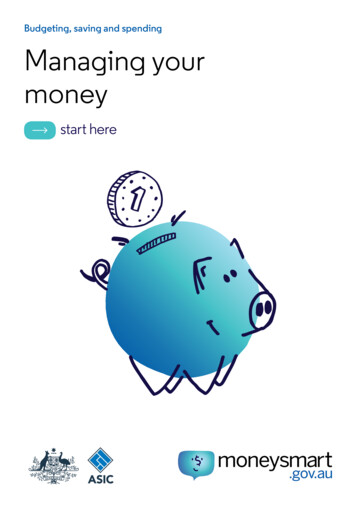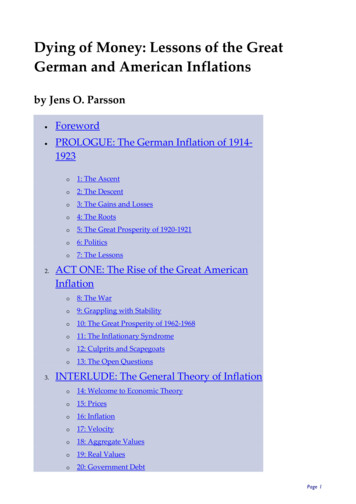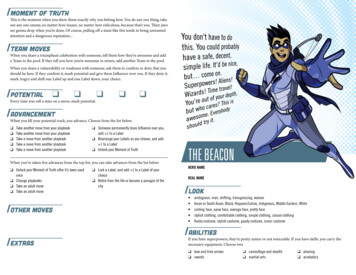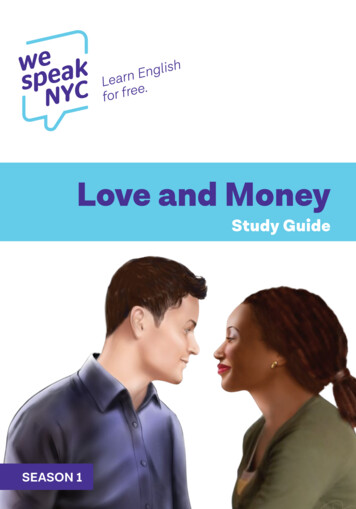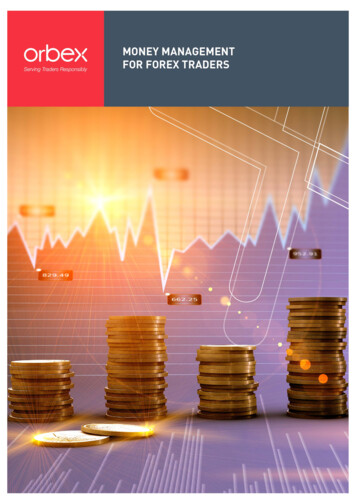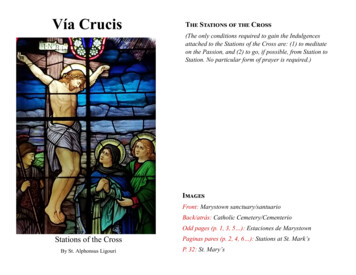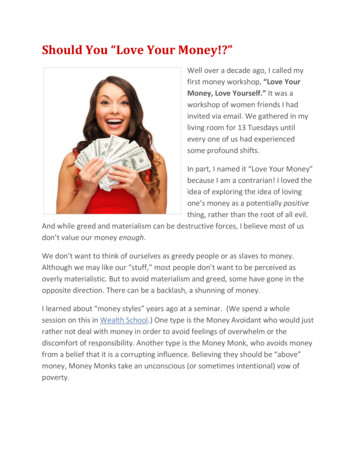
Transcription
Should You “Love Your Money!?”Well over a decade ago, I called myfirst money workshop, “Love YourMoney, Love Yourself.” It was aworkshop of women friends I hadinvited via email. We gathered in myliving room for 13 Tuesdays untilevery one of us had experiencedsome profound shifts.In part, I named it “Love Your Money”because I am a contrarian! I loved theidea of exploring the idea of lovingone’s money as a potentially positivething, rather than the root of all evil.And while greed and materialism can be destructive forces, I believe most of usdon’t value our money enough.We don’t want to think of ourselves as greedy people or as slaves to money.Although we may like our “stuff,” most people don’t want to be perceived asoverly materialistic. But to avoid materialism and greed, some have gone in theopposite direction. There can be a backlash, a shunning of money.I learned about “money styles” years ago at a seminar. (We spend a wholesession on this in Wealth School.) One type is the Money Avoidant who would justrather not deal with money in order to avoid feelings of overwhelm or thediscomfort of responsibility. Another type is the Money Monk, who avoids moneyfrom a belief that it is a corrupting influence. Believing they should be “above”money, Money Monks take an unconscious (or sometimes intentional) vow ofpoverty.
I had been both an Avoidant and a Money Monk. A religion major in college, alsoa musician, that was two strikes against me when it came to money! I thought ofmyself as non-materialistic and also bought into the “starving artist” perception.Mindset is powerful. At the time, my beliefs about money could be summed up inone short phrase:“Money isn’t important.”Surely the world’s problems were caused by people with money, I thought. Theirlove of money corrupted their priorities, I concluded. And the proper response, Ireasoned, was to not care about money!I carried around the “Money isn’t important” belief like a knapsack, which wasstuffed with a good bit of self-righteousness as well. It relieved me of muchresponsibility, and also from any ability to contribute meaningfully.“Money isn’t important” became a story that kept me stuck, making just enoughto pay my bills and take an occasional budget vacation. Yet it deprived me of anyreal freedom. It was a story that “worked” for me, more or less, until I had nomoney.
Then, in the midst of a failing business and a divorce—when I didn’t know how Iwas going to afford to keep on my lights, pay my mortgage, or support myself—allof the sudden, money became VERY important.I never want to be a slave to money. Yet who is more free—the person whostruggles constantly to make ends meet, or the person who has savings,investments, and an emergency fund? I found out the hard way. Being addicted topoverty or worse—self-righteousness about poverty—does not make anyonefree.I’ve heard it said that you can never be poor enough to help someone who is poorany more than you can be sick enough to help someone who is sick. I realized thatmy “Money isn’t important” story had only left me trapped and powerless.Freedom comes from choice.There is a freedom that comes fromnot letting money make ourdecisions for us. Our intentionsshould drive our decisions, notdollars!It is freeing to be able to choosebetween camping and a luxury hotelwithout any need to keep up w theJoneses. Do you feel like being closeto nature or enjoying luxury? There are benefits to both, but we don’t havefreedom when we’re stuck in scarcity.Abundance comes from the ability to both give and receive. And if we areavoiding money or believe ourselves to be above it, we’re not open to receiving.In our desire for true freedom, perhaps we have confused materialism withmoney itself.
I used to think that money was unimportant at best, downright dangerous atworse. But the real problem is materialism, not money itself. Materialism isdefined as “a tendency to consider material possessions and physical comfort asmore important than spiritual values.”By fearing money, I was actually giving money too much power, while reinforcingmy own experience of scarcity in the process.Money is neither good nor bad. It is a medium of exchange, like the gold coinsand pelts and shells and other mediums of exchange that came before it.If money has a power, its power is the ability to magnify our intentions. If you area kind and generous person, money will expand your ability to live well and givemore. If you are a greedy narcissist, money will likely expand your ability tobe that.Can we love money too much, or love it inappropriately?Absolutely! We can make it our god, suffer to acquire it, place it aboverelationships and our own well-being.On the other hand, we can also suffer from not loving money enough. I’ve seenthis happen to myself, to friends, to acquaintances and to clients.I’m sure you’ve seen people who: Waste money it as if it has no value. Gamble it away at a casino or on high-risk investments. Consistently under-earn due to lack of confidence or negotiation. Spend money on emotional wants while neglecting needs. Fail to save anything for the future, a rainy day, or those who depend onthem perhaps even justifying irresponsibility with self-righteous logic orby convincing themselves they are just “victims of circumstance.”
Should we love our money?We should not worship it,compromise ourselves for it,sacrifice our values and relationshipsfor it. But we should value money forwhat it is and respect its role.We should love the good that wecan do with money. We shouldappreciate it and be grateful for it.We should love money enough to keep it around. To not trade it all away forevery experience, sale, trend or impulse item that comes our way. Money is bestspent on what we truly value.We should treat money well and it will treat us well. We have to love ourselvesenough to invest in our own future to save, to invest, to be disciplined withhowever much money we do have.Loving our money is one way we can love ourselves.You’ve probably heard of saving described as “Paying yourself first.” That’s a goodway to think of it. By learning to love, respect, and value money, we learn to love,respect and value ourselves.If we treat money as if it is unimportant, we are also treating our future needs,dreams and desires as unimportant.Our treatment of money reflects how we treat ourselves. Do we love and valueourselves through caring for our cash, or do we allow our future selves to bedependent on the government or at the mercy of others? Do we love and valuethe dreams that money can help us realize by treating it respectfully and withresponsibility?
Money is, in many ways, a mirrorthat reflects our internal world. Lookand see how you are practicingfinancial self-care. Be honest aboutthe ways you may sabotage yourtrue desires through unconscious orhabitually spending.“The love of money is the root of allkinds of evil,” states the NewTestament. With all due respect tobiblical wisdom, many of us couldstand to love our money more.Love Your Money, Love Yourself.Value your money. Respect it, appreciate it, be grateful for it. Spend it wisely onwhat matters. Love the person you are becoming – your future self – by lovingmoney enough to keep some of it around. Nurture it, grow it, allow it to serve andsustain you.Money itself, as represented by paper and coins, has little inherent value.However, peace of mind, freedom of choice, true self-care, soul-expandingexperiences and the generous difference money allows you to make canbe priceless.When money serves your highest purposes and allows you to fulfill your missionin the world, it is worth loving! Just never above all else. Learn to use money tolove yourself and others and you’ll have it in the proper perspective.Money is energy—and so are you! Don’t look at money as “separate” from you.Be in partnership with it. Let it flow. Allow yourself to give, receive, and loveyourself—in every way. See money as a tool for love, and so it will be.—Kate Phillips, Total Wealth
Join me for a complimentary course:Join me for the “Love YourMoney, Love Your Self!”complimentary mini-course.It happens February 14 – 18.It’s virtual and there is no costother than your investment oftime.In “Love Your Money, Love Your Self!” you’ll learn—and experience—how to openyourself up to greater wealth through yourself MORE! I’ll cover:MONDAY, Feb. 14: Money and Love.Why love is the foundation of wealth!TUES, Feb. 15: The Resistance.What blocks you from having more money?WED, Feb 16: Women and Money:The good, the bad, and the beautiful!THURS, Feb 17: Money M.A.P.S.Discover the path to wealth!FRI, Feb 18: Financial Transformation.A new paradigm for wealth and abundance!The trainings begin February 14 at 11am Pacific/2pmEastern each day. Get access at LoveYourMoney.gr8.com.I hope to see you there!Kate PhillipsTotalWealthSchool.com
Money, Love Your Self!" complimentary mini-course. It happens February 14 - 18. It's virtual and there is no cost other than your investment of time. In "Love Your Money, Love Your Self!" you'll learn—and experience—how to open yourself up to greater wealth through yourself MORE! I'll cover: MONDAY, Feb. 14: Money and Love.
